Exploring the Souks of Dubai: A Comprehensive Guide
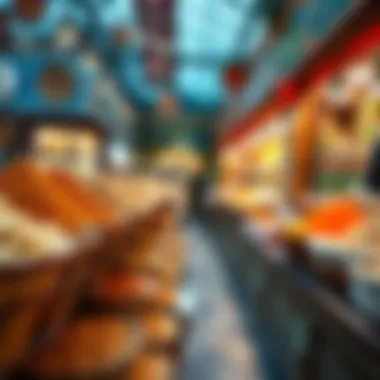
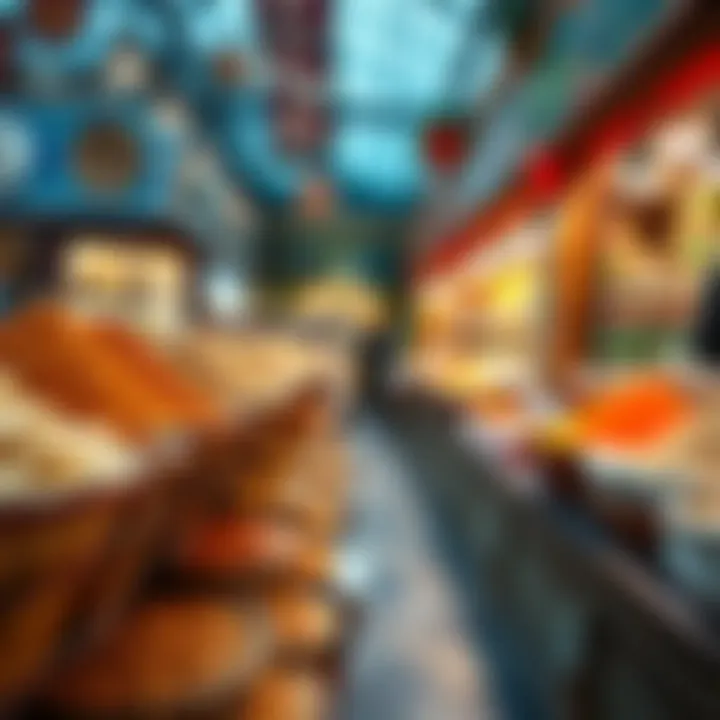
Intro
The souks of Dubai offer a glimpse into the city’s soul; they are more than just shopping destinations. Each market is a tapestry woven from threads of history, culture, and commerce. From the vibrant hues of spices to the breathtaking displays of gold, these traditional markets echo tales of traders and travelers from times long past.
As Dubai has developed into a leading global hub, the souks hold their ground, reminding us of the commerce's roots that shaped this thriving metropolis. Investors, travelers, and culture enthusiasts flock to these bustling markets seeking not just commodities but experiences that embody the essence of Dubai.
The world of the souks is characterized by an atmosphere that vibrates with energy and tradition. Here, you find local artisans displaying their crafts alongside vendors brimming with stories and connections. The popularity of these markets extends beyond mere tourism; they play a significant role in the city’s evolving real estate landscape, especially in areas where cultural tourism intertwines with economic growth.
This guide will navigate through various souks, shedding light on their unique features, the cultural significance they encapsulate, and the economic opportunities they present for potential investors. Whether you are a curious traveler or a prospective investor exploring new avenues, this exploration reveals how the past and present coexist in the heart of Dubai’s marketplaces.
Foreword to Dubai's Souks
The souks of Dubai are a vibrant tapestry of culture, trade, and history, interwoven into the fabric of the city itself. Rather than simply places to shop, these traditional markets serve as living museums, offering glimpses into the past while remaining relevant in the fast-paced modern world. Understanding the soul of Dubai's souks is essential for anyone keen on grasping the true cultural underpinnings of this cosmopolitan city.
Dubai's souks charm visitors with their allure of authenticity and the chance to negotiate for unique items—there’s an art in bargaining, and it transforms shopping into an engaging experience. Souks are not just shops; they are venues where community life flourishes, where friendships are forged, and where stories are shared amidst the fragrant air filled with spices and the glittering presence of gold and textiles.
Defining Souks
At their core, souks are traditional marketplaces that embody the spirit of trade—often bustling with activity, sounds, and the clinking of coins. The term "souk" comes from the Arabic word "سوق," denoting a market or marketplace. Each souk has its specialty, from spices and textiles to gold and perfumes. Here, merchants display their goods, engaging in lively interactions with customers, creating an atmosphere that feels both chaotic and joyful.
The layout of souks tends to be intricate, resembling a maze. This labyrinthine structure sometimes feels overwhelming, but it adds a layer of adventure. The blend of narrow alleyways and wide open spaces creates a dynamic shopping experience where serendipity reigns—an unexpected find often waits just around the corner.
The Historical Context
Dubai's souks are more than modern shopping hubs; they are steeped in history. They have roots that stretch back centuries, traceable to when the Arabian Peninsula was a vital trading route. The bustling souks thrived during a time when merchants traversed the waters of the Arabian Gulf and the deserts of the region, trading goods ranging from spices to textiles.
Historically, the souks played a significant role in fostering economic relationships, creating bonds not just between traders but also between diverse cultures. They evolved with the times, blending traditional practices with new influences brought in by global trade. The Gold Souk, for example, reflects the wealth generated by oil money in the latter half of the 20th century, transforming it into a dazzling display of jewels.
"The essence of the souk is a dance between history and modernity, where each stall tells a tale, and each alleyway invites curiosity."
Through the years, while modern shopping malls emerged in Dubai, the soul of the souks remained remarkably intact, standing as a testament to the city's rich heritage. The combination of tradition and contemporary culture ensures that these markets continue to thrive in ways that resonate both with locals and international visitors.
Understanding the significance of the souks provides crucial context for appreciating not just their nostalgic charm, but also their continued relevance in today’s economic landscape. These markets are a window into the past, a heartbeat of the present, and potentially a guiding light for the future of commerce in Dubai.
Cultural Importance of Souks
The souks of Dubai are far more than just marketplaces; they are vibrant cultural hubs that reflect the rich heritage of the region. In this section, we explore the various dimensions of their significance in shaping Dubai's identity, connecting its past with its present and future.
Tradition Meets Modernity
As you stroll through the winding alleys of the souks, it becomes apparent how tradition intertwines with modernity. These markets are akin to living museums, showcasing traditional crafts such as weaving and intricate metalwork alongside high-tech innovations. For instance, while you can find authentic Arabic coffee in a traditional setting, digital screens advertising fresh spices and popular products have also taken their place among the wooden stalls. Visitors often observe artisans at work, with each piece reflecting a rich story—an artistry that has been passed down through generations. This blend is essential for young Dubai, as it strives to maintain its cultural roots while accepting globalization.
With foundation dates that trace back centuries, each corner of the souks whispers tales of history. Yet, these markets also adapt, offering modern conveniences—like new payment methods and air-conditioned shopping spaces. The following points highlight how this duality benefits investors as well:
- Investment Opportunities: Traditional crafts attract both tourists and investors, paving the way for ventures that focus on heritage tourism.
- Cultural Marketing: Businesses can tap into the narrative of tradition versus modernity to enhance their brands.
Community Gathering Spaces
Beyond commerce, the souks serve as crucial community gathering spots. They are alive with the sound of bartering voices, the aroma of spices, and the laughter of families shopping together. Locals and tourists alike converge here, creating a melting pot of cultures and experiences. The bustle within the souks reflects the heart of Dubai, where social interaction plays a significant role in everyday life.
Souks like the Spice Souk provide spaces for conversations, relaying gossip or sharing culinary tips. These interactions are not merely transactional but are crucial for community bonding, enriching the social fabric of the city. Consider these aspects when assessing their importance:
- Cultural Exchange: Visitors learn about local customs and traditions while locals gain exposure to diverse cultures.
- Support for Local Economy: Small vendors and artisans thrive, helping to preserve local customs while generating economic activity.
"The souk is a microcosm of Dubai's larger narrative—a chaotic charm that fosters connection amid bustling trade."
In summary, the cultural importance of Dubai's souks is significant not only for their role in commerce but also as platforms for community interaction, cultural exchange, and economic sustenance. The dialogue between tradition and modernity makes them vital to the city's identity and offers unique opportunities for investors and visitors alike.
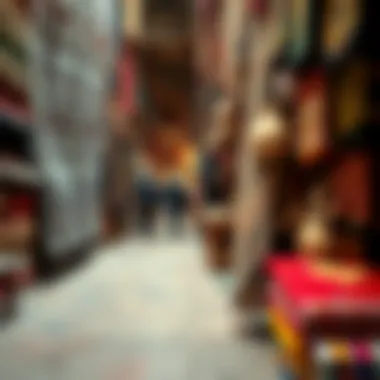
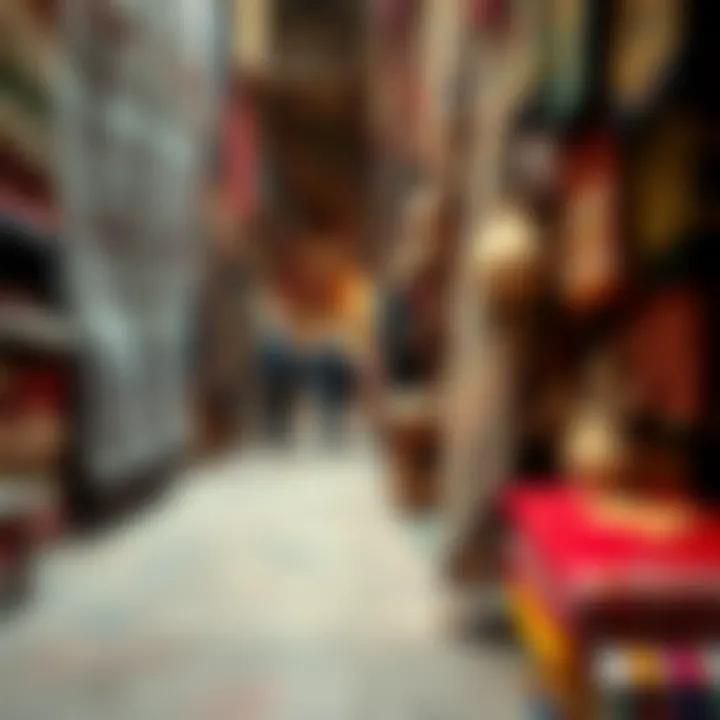
Prominent Souks in Dubai
The souks of Dubai represent not just a shopping destination; they are vivid extensions of the city's rich cultural tapestry. Each souk serves as a living museum of Dubai's history, tradition, and commerce. As these bustling markets draw visitors from all over the world, understanding their individual characteristics is crucial for anyone looking to experience the true spirit of the city. The diversity offered in each marketplace distinctively appeals to various tastes, making them integral destinations for both leisure and investment. Below, we delve into some prominent souks that showcase Dubai's unique offerings.
Gold Souk: A Jewel of Dubai
The Gold Souk is perhaps the most iconic of Dubai's souks, renowned globally for its astonishing array of gold jewelry. Stroll through the narrow lanes lined with shop after shop displaying glittering pieces that range from intricate designs to bold, heavy statements. Here, the shimmering gold catches the eye of every passerby, making it impossible to resist.
Why Visit? The prices here are surprisingly competitive, especially when compared to global markets. Buyers can find everything from traditional pieces, like gold bangles adorned with filigree work, to modern designs that appeal to younger generations. Additionally, many shops offer customization options, allowing for personalized jewelry that speaks to individual tastes.
Spice Souk: Aromatic Wonders
Situated close to the Gold Souk, the Spice Souk captivates the senses with its olfactory delights. The air is filled with a symphony of aromas, ranging from earthy saffron to spicy za'atar. Wooden crates overflow with colorful spices and herbs, while vendors enthusiastically explain the origins and uses of their goods.
Why Visit? It’s a sensory experience that goes beyond mere shopping. Here, one can learn about the culinary secrets of Middle Eastern cuisine while sampling the myriad ingredients. It’s also a great opportunity to purchase unique gifts or decorative items, such as saffron, sumac, and even exotic teas.
Textile Souk: A Tapestry of Colors
Wandering into the Textile Souk feels like stepping into a world of color and texture. This marketplace showcases an extensive selection of fabrics, from vibrant silks to hand-woven carpets. Stalls teem with brightly colored rolls, inviting visitors to touch and feel the quality of each swatch. The artistry in the textiles is unmatched, often reflecting the cultural influences of various regions.
Why Visit? Here, shoppers can find items ranging from traditional Arabic attire to modern fashion fabrics. Bargaining is customary, and the process is made enjoyable by friendly interactions with vendors who are passionate about their goods. Each purchase can be a ticket to a piece of Dubai's rich heritage.
Perfume Souk: Capturing Scents
The Perfume Souk offers an enchanting exploration into the world of fragrances, where traditional scents are expertly crafted. Shops brim with bottles of Oud, Bakhoor, and other artisanal perfumes, many crafted from rare and exotic ingredients. The experience here is immersive; many visitors are invited to smell various concoctions before making a selection.
Why Visit? Apart from the familiar commercial perfumes, this souk allows you to discover unique blends tailored to your preferences. It's an opportunity to find a fragrance that isn't mass-produced, making your purchase feel special and personal.
Fruit and Vegetable Souk: A Fresh Perspective
Located near the bustling central market, the Fruit and Vegetable Souk offers a delightful departure from the more traditional marketplaces. This vibrant area showcases an impressive array of fresh produce that reflects the agricultural richness of the region. Stalls line the paths, overflowing with colorful fruits and vegetables from local farms.
Why Visit? It’s a window into daily life in Dubai. Shoppers can interact with local vendors, gaining insights into the seasonal offerings and even tips on how to prepare traditional dishes. It’s also an excellent place to grab fresh snacks or ingredients if you’re planning to whip up a meal at your accommodation.
"Markets like these bridge the past with the present, making them essential components of a visit to Dubai."
These prominent souks not only enhance the shopping experience but also serve as cultural landmarks that epitomize the soul of Dubai. Visitors and investors alike can appreciate the distinct offerings each souk provides, making them noteworthy stops on any exploration of the city.
Architectural Features of Souks
Visiting the souks of Dubai is not just about engaging with the vibrant markets but also about experiencing the architectural marvels that define these spaces. The architecture of the souks reflects a harmonious blend of tradition and innovation, holding significance for both locals and visitors. In this discussion, we will explore the essential architectural features that contribute to the unique identity of these markets, emphasizing how these structures enhance the cultural experience while also serving practical purposes.
Traditional Design Elements
Traditional souks in Dubai are characterized by their distinct architectural features rooted in the historical context of the region. Stone and coral are prevalent materials, still paying homage to the heritage of the local environment. One cannot miss the mashrabiya, a latticework that forms a critical aspect in maintaining ventilation while providing privacy. These wooden screens, often intricately carved, also allow for natural light to filter through, creating an ambiance that is both enchanting and functional.
Another hallmark of traditional souk design is the courtyard layout, promoting communal interaction. These open spaces are not only aesthetically pleasing but also provide shelter from the arid climate, allowing shoppers and merchants to engage without the full brunt of the sun. The narrow alleys, methodically arranged, serve to guide visitors through a labyrinth of scents, colors, and sounds, often leading to the unexpected.
Each element is intentional, forming a cohesive structure that encourages social gathering, trade, and cultural exchange. For example, the way sights and sounds are organized enhances the overall shopping experience, deepening one’s connection to the vibrant marketplace.
Modern Adaptations
As Dubai evolves, so too do its souks. Modern adaptations have transformed some traditional features to cater to the demands of contemporary commerce while still paying respect to the past. The introduction of air-conditioning systems has been a game-changer, allowing for a more comfortable shopping experience, particularly during the sweltering summer months. However, efforts are being made to integrate such technology without compromising the soul of the markets.
Moreover, the construction of indoor souks, such as the Souk Madinat Jumeirah, showcases how traditional elements can smoothly blend with modern architectural practices. These indoor markets replicate the charming appearance of outdoor souks but offer climate control and enhanced amenities, appealing to a broader range of tourists and residents.
The use of sustainable materials and energy-efficient designs is another modern trend that cannot be overlooked. With the increasing emphasis on eco-friendly architecture, these adaptations are critical in ensuring the longevity of the souks while also promoting environmental responsibility. For instance, the integration of solar panels is becoming more common, paving the way for a greener marketplace.
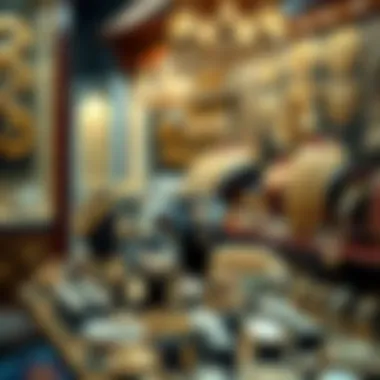
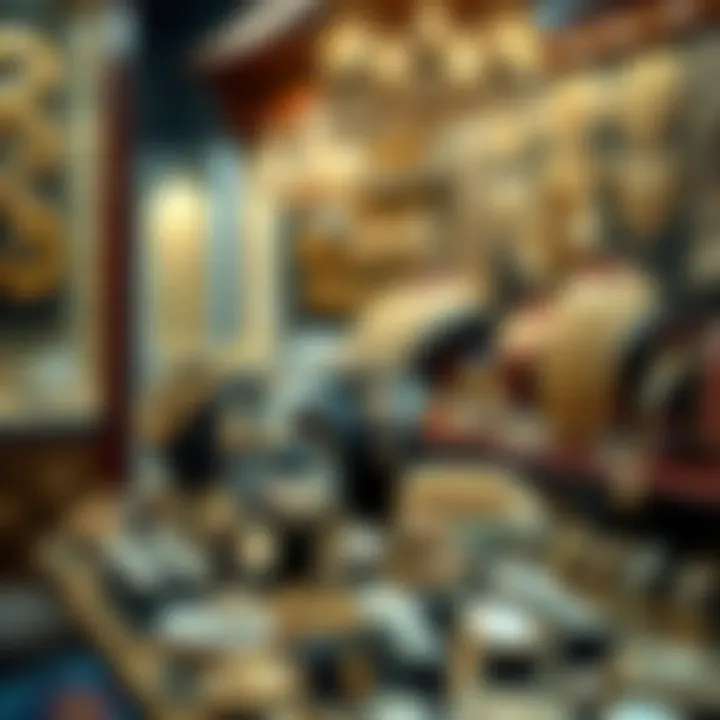
In understanding both traditional design elements and modern adaptations, one gains insight into the evolving nature of Dubai's souks, reflecting a balance between heritage and innovation.
In summary, the architectural features of Dubai's souks play a crucial role in their identity, influencing not just how they look but also how they function within the city’s broader socio-cultural landscape. By embracing both traditional and modern elements, these markets stand as a testament to Dubai's commitment to preserving its past while being firmly anchored in the present and future.
For further reading on Dubai's rich architectural heritage, you may visit Wikipedia or explore engaging discussions on platforms like Reddit.
Visiting the Souks: What to Expect
When you step into the souks of Dubai, you're not just entering markets; you're diving into a realm steeped in rich tradition and vibrant culture. These bustling marketplaces are vital to the city's fabric, pulling together threads of history, commerce, and community. Knowing what to expect can greatly enhance your experience, whether you're a first-time visitor or a seasoned explorer.
Navigating the Market
Navigating the winding pathways of the souks may seem daunting at first, with their labyrinthine layouts and myriad stalls, each overflowing with unique goods. However, understanding a few key aspects can transform this experience into an enjoyable jaunt. The souks' design often intertwines narrow alleys with wider gathering spots, allowing for both intimate exploration and larger social gatherings.
- Layout Familiarization: It's wise to familiarize yourself with the layout. The Gold Souk, Spice Souk, and others boast distinct atmospheres. Each corner can offer something completely new, yet also seems to lead you back to familiar ground if you get lost.
- Landmarks for Guidance: Use significant landmarks, such as tall minarets or distinctive shop signs, as reference points to avoid losing your way. Having a physical map or a reliable mobile navigation app could also make your journey smoother, though many prefer to immerse fully, letting curiosity guide them.
- Timing Your Visit: Visiting during early morning or early evening, when the sunlight softens and activity is lively yet pleasant, can provide a more enjoyable experience. The crowd is usually lighter at these times compared to the midday rush.
As you stroll, keep your eyes peeled for products that reflect Dubai’s multicultural tapestry—from Arabian textiles to South Asian spices, each item has its story.
Bargaining Culture
Bargaining is not merely tolerated in the souks; it’s an integral part of the shopping experience. Many vendors expect some haggling, and engaging in this practice can be as enjoyable as the shopping itself. Here are some insights into this traditional custom:
- Understanding the Game: Know that the initial price isn’t always what you’ll pay; mark-ups are common. Salespeople often start higher, expecting negotiations. You might enter with a counter-offer that feels fair; it's all part of the charm.
- Building Rapport: Building a rapport with vendors can work in your favor. A friendly exchange, often peppered with a bit of humor, may soften the seller’s heart, yielding better deals as they sense your interest and genuine appreciation for their wares.
- Cultural Sensitivity: Keep in mind that how you approach bargaining should be culturally respectful. A casual, non-aggressive attitude often yields better results than being overly stern. After all, it’s meant to be an exchange that leaves both parties satisfied.
Bargaining is seen more as a dance rather than a contentious battle, allowing you to connect with local culture and shopkeepers on a personal level.
“The souk experience is about way more than just shopping; it's connecting with a piece of history and culture.”
By being prepared, respectful, and willing to engage in the rhythms of the market, navigating and shopping in Dubai's souks can transform into a memorable adventure replete with learning and growth.
The Souks and Dubai's Real Estate Market
The souks of Dubai are more than just marketplaces; they are vital threads in the fabric of the city's real estate landscape. Understanding how these traditional markets influence neighborhood development and investment prospects is essential for anyone looking to grasp the full picture of Dubai's real estate dynamics. The vibrancy of the souks attracts tourists and residents alike, which, in turn, drives demand for surrounding properties, making it a significant area of interest for investors and developers.
Impact on Neighborhood Development
The presence of souks can significantly shape the surrounding neighborhoods. Traditionally, these markets acted as the heart of the community, fostering local commerce and social interaction. As Dubai has evolved into a metropolitan hub, the role of the souks has also changed but remains crucial.
- Attracting Foot Traffic: Souks such as the Gold Souk and Spice Souk draw large crowds. This influx creates a bustling atmosphere that encourages businesses to thrive nearby. New cafes, shops, and entertainment venues often crop up around these areas, contributing to urban development.
- Enhancing Property Values: Areas close to popular souks generally see an appreciation in property values. As the demand for residential and commercial spaces increases, developers are keen to leverage the proximity to these vibrant markets, which have become desirable locations for both living and working.
- Maintaining Cultural Integrity: While growth and modernization can lead to gentrification, the traditional essence of the souks often helps maintain a cultural anchor in their neighborhoods. Development projects surrounding these markets sometimes include designs that pay homage to traditional architecture, preserving the historical context and charm of the area.
In essence, the souks serve as catalysts for neighborhood evolution, enhancing the quality of life and real estate appeal.
Investment Prospects in Souk Areas
Investing in residential or commercial properties near souks presents numerous opportunities. The unique characteristics of these locations make them ideal for various ventures.
- High Rental Demand: Due to their cultural significance and popularity among tourists, properties near souks can generate higher rental yields. Investors could capitalize on short-term rental markets, catering to visitors eager to immerse themselves in the traditional experiences offered by the souks.
- Diverse Business Opportunities: The vibrancy of souk areas encourages entrepreneurial ventures. From artisanal shops to modern eateries, the demand for unique experiences in close proximity to the markets is steadily growing. Moreover, commercial properties in these regions often attract dynamic retail and dining establishments, which can be quite lucrative.
- Government Initiatives: The Dubai government actively promotes investment in areas surrounding the souks. With various real estate projects on the horizon, including infrastructural advancements and community developments, the potential for growth seems promising.
"Investing in properties near the souks not only provides financial opportunities but also contributes to the sustainability and cultural preservation of Dubai."
In summary, the souks play a pivotal role in shaping Dubai's real estate market. As community hubs, they influence neighborhood development and are central to investment strategies for investors eyeing profitable opportunities within the city. The symbiotic relationship between the souks and real estate development is essential, marking the souks as fundamental touchstones of Dubai's urban evolution.
For further reading and data on Dubai's real estate market trends, visit Dubai Land Department or Bayut.com.
Also, for insights on cultural elements, check Encyclopaedia Britannica.
This thorough appreciation of the souks and their impact brings to light both the opportunities and responsibilities that come with investing in such historically significant places.
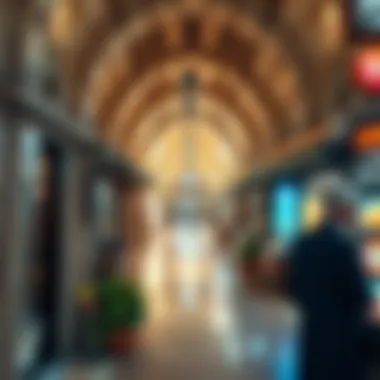
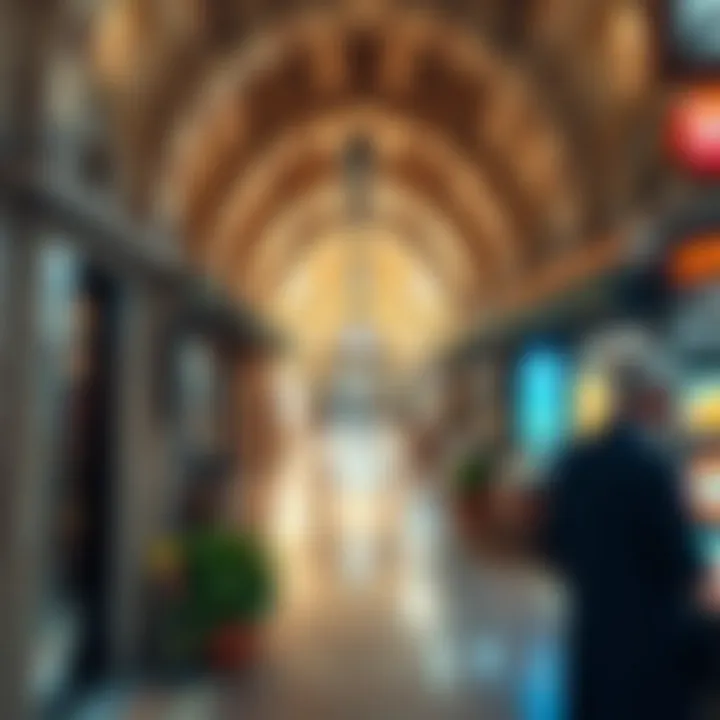
Dining and Leisure Near Souks
When you find yourself navigating the vibrant mazes of Dubai's souks, it's not just about shopping. There's an entire world of culinary and leisure experiences waiting just around the corner. The souks, with their eclectic mix of scents, sounds, and sights, set the perfect stage for indulging in traditional cuisine or winding down after a bustling day. These spaces serve not only as trade hubs but also as areas that bring people together to relax, dine, and connect, making them essential for both locals and visitors alike.
Culinary Offerings
One of the most enticing aspects of visiting the souks is the array of culinary delights available. The area is a feast for the senses, with street vendors and small cafes lining the walkways, each offering mouthwatering dishes that reflect the rich tapestry of Emirati and Middle Eastern flavors.
- Street Food Extravaganza: You can’t miss trying a shawarma, a popular street food wrap made with marinated meat, fresh vegetables, and tantalizing sauces. It's a quick meal, easy to eat on the go as you browse through the stalls.
- Heritage Cuisine: For a more authentic experience, dining options like the Al Fanar Restaurant provide traditional Emirati meals. Here, you could enjoy dishes like machboos, a fragrant rice dish with saffron and spices, often served with delicious meats or seafood.
- Sweet Treats: Don’t forget to indulge in local sweets. Sipping kahwa, the traditional Arabic coffee, paired with dates or baklava adds a sweet finish to your exploration.
Dining here is not merely about food; it's an experience that lands you in the heart of Dubai’s culinary landscape, allowing you to appreciate local flavors and hospitality in a warm environment.
Cultural Performances and Events
The vibrant atmosphere of the souks extends beyond shopping and dining; it is often alive with cultural performances and events that reflect Dubai's rich heritage.
- Live Music and Dance: From traditional Ayallah performances to contemporary music, the souks sometimes host live shows. The rhythm of the drums and the sway of the dancers offer a captivating backdrop as you wander through the marketplace.
- Artisan Demonstrations: You may stumble upon local artisans showcasing their craftsmanship. They might be weaving textiles or making handcrafted items, welcoming you to see the artistry up close.
- Festive Celebrations: During cultural holidays and festivals, the souks become a hub of festivities, featuring parades and markets. It's a prime opportunity to revel in the communal spirit and engage with local traditions.
Engaging with the cultural performances not only enhances your shopping experience but allows you to interact with the essence of Dubai’s community spirit, forging connections through shared appreciation for art and heritage.
In summary, dining and leisure experiences near the souks provide a unique blend of culinary delights and cultural showcases. Embracing these elements can immensely enrich your visit, making it memorable and distinct from the shopping alone.
Challenges Facing Traditional Souks
The evolution of Dubai's traditional souks has not come without its hurdles. In a rapidly modernizing city where skyscrapers dominate the skyline, the souks must grapple with the forces that both threaten their existence and offer opportunities for growth. Understanding these challenges is essential not just for preserving cultural heritage but also for ensuring these markets continue to thrive, benefiting not only the community but also potential investors.
Modernization vs. Tradition
The tug-of-war between modernization and tradition has intensified in recent years. Dubai’s rapid development has seen the rise of gleaming malls and skyscrapers, which offer the allure of modern convenience. On one hand, the souks offer authentic experiences, deeply rooted in history and culture. On the other, the modern shopping centers draw in customers with climate control, ample parking, and a diverse range of offerings.
As a result, many traditional souk owners are caught in a quandary. They face the pressing need to adapt:
- Technology Integration: Adding online shopping or mobile apps can help souk vendors reach a wider audience.
- Infrastructure Improvements: Enhancing the physical spaces with better lighting and ventilation can make visits more pleasant.
Yet, adapting too much can risk diluting the very essence of these markets. Vendors must balance innovation with the preservation of traditions that define their unique character. The challenge lies in keeping tradition alive while not being left behind in the race toward modernity.
Preservation Efforts
Recognizing the challenges, several initiatives have emerged to protect and preserve the essence of Dubai's souks. From governmental policies to grassroots movements, the focus is on both maintaining cultural heritage and adapting to modern needs.
Some key preservation efforts include:
- Community Engagement: Local residents and authorities are stepping up to participate in events celebrating traditional crafts and markets.
- Support from the Government: Initiatives like the Dubai Cultural Heritage Committee have been formed to promote and protect traditional markets, ensuring that they continue to thrive amidst changing times.
- Cultural Festivals: Events showcasing local artisans and traditional performances draw visitors, keeping the souk atmosphere alive through lively interactions.
"The soul of Dubai lies within its souks. If we let them fade away, we diminish a part of who we are as a society."
Closure: The Future of Souks in Dubai
As we look ahead, the souks of Dubai stand at a crossroads, balancing the weight of tradition against the demands of modernization. These bustling markets have been pivotal in shaping the city’s economic and cultural landscape, serving as critical hubs for trade and community. However, in a rapidly evolving urban environment, the future of these traditional marketplaces hinges on a few key elements.
Maintaining Cultural Heritage
The preservation of cultural heritage is crucial for the souks. They are not just places to shop; they are repositories of stories, history, and community identity. To maintain this heritage, we must focus on several strategies:
- Restoration Initiatives: Investing in restoring and maintaining existing structures will ensure that the unique architecture and ambiance of the souks are not lost. This doesn’t only protect the aesthetic; it also preserves a sense of place that resonates with both locals and tourists.
- Cultural Programs: Promoting cultural events and traditional crafts within the souks can attract a diverse crowd who appreciate the artistry and history behind these markets. Workshops showcasing local crafts such as pottery, textiles, or spice blending could rejuvenate interest in traditional wares.
- Community Involvement: Engaging local traders in decision-making processes about the future of the souks will help ensure that changes reflect the community's needs and desires. Their intimate knowledge of the market dynamics will be invaluable in maintaining a vibrant atmosphere.
"The souks are more than just marketplaces; they are living museums that showcase Dubai's rich heritage. Preserving them is preserving our history."
Potential for Growth
While challenges exist, the future of Dubai’s souks also holds considerable promise for growth, driven by both local and international interest. Several avenues present themselves:
- Investment Opportunities: Developers looking to invest in areas around the souks find rich potential. Projects aimed at enhancing connectivity and access can dramatically increase footfall, bringing renewed vitality to the area. Commercial establishments like cafes and artisanal shops can flourish alongside traditional markets.
- Fusion of Traditions and Technology: Incorporating technology, like augmented reality experiences, could allow visitors to explore the history of the souks in engaging ways. Virtual tours and online platforms could expand reach, enabling more people to experience the souks, even from afar.
- Tourism Tailoring: As the global tourism sector rebounds, a focus on experiential travel can draw visitors looking to immerse themselves in local culture. Curated experiences that combine visits to the souks with workshops or culinary tours could make the area a must-see on any itinerary.
In summary, while the souks have their work cut out for them, they also possess an incredible potential for adaptation and growth. Balancing tradition with innovation can help them thrive in the coming years, ensuring they continue to be a vibrant part of Dubai's cultural and economic fabric.



